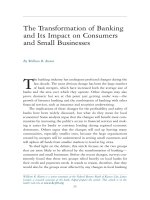01 digital entrepreneurship impact on business and society, springer, 2021 (1)
Bạn đang xem bản rút gọn của tài liệu. Xem và tải ngay bản đầy đủ của tài liệu tại đây (5.6 MB, 340 trang )
See discussions, stats, and author profiles for this publication at: />
Digital Entrepreneurship. Impact on Business and Society
Book · November 2020
CITATIONS
READS
3
826
3 authors:
Lutz Göcke
Mariusz Soltanifar
Nordhausen University of Applied Science
Open Universiteit Nederland
29 PUBLICATIONS 17 CITATIONS
27 PUBLICATIONS 37 CITATIONS
SEE PROFILE
Mathew Hughes
Loughborough University
113 PUBLICATIONS 4,598 CITATIONS
SEE PROFILE
Some of the authors of this publication are also working on these related projects:
Entrepreneurial Orientation View project
Family social capital View project
All content following this page was uploaded by Mathew Hughes on 14 January 2021.
The user has requested enhancement of the downloaded file.
SEE PROFILE
Future of Business and Finance
Mariusz Soltanifar
Mathew Hughes
Lutz Göcke Editors
Digital
Entrepreneurship
Impact on Business and Society
Future of Business and Finance
The Future of Business and Finance book series features professional works aimed
at defining, describing and charting the future trends in these fields. The focus is
mainly on strategic directions, technological advances, challenges and solutions
which may affect the way we do business tomorrow, including the future of
sustainability and governance practices. Mainly written by practitioners, consultants
and academic thinkers, the books are intended to spark and inform further
discussions and developments.
More information about this series at />
Mariusz Soltanifar Á Mathew Hughes Á
Lutz Göcke
Editors
Digital Entrepreneurship
Impact on Business and Society
123
Editors
Mariusz Soltanifar
Hanze University of Applied Sciences
International Business School
Groningen, The Netherlands
Mathew Hughes
Loughborough University
School of Business and Economics
Loughborough, Leicestershire, UK
Open University
Faculty of Management
Heerlen, The Netherlands
Lutz Göcke
Nordhausen University of Applied Sciences
Chair of Digital Management
Nordhausen, Germany
ISSN 2662-2467
ISSN 2662-2475 (electronic)
Future of Business and Finance
ISBN 978-3-030-53913-9
ISBN 978-3-030-53914-6 (eBook)
/>© The Editor(s) (if applicable) and The Author(s) 2021. This book is an open access publication.
Open Access This book is licensed under the terms of the Creative Commons Attribution 4.0
International License ( which permits use, sharing, adaptation, distribution and reproduction in any medium or format, as long as you give appropriate credit to
the original author(s) and the source, provide a link to the Creative Commons license and indicate if
changes were made.
The images or other third party material in this book are included in the book’s Creative Commons
license, unless indicated otherwise in a credit line to the material. If material is not included in the book’s
Creative Commons license and your intended use is not permitted by statutory regulation or exceeds the
permitted use, you will need to obtain permission directly from the copyright holder.
The use of general descriptive names, registered names, trademarks, service marks, etc. in this publication does not imply, even in the absence of a specific statement, that such names are exempt from the
relevant protective laws and regulations and therefore free for general use.
The publisher, the authors and the editors are safe to assume that the advice and information in this
book are believed to be true and accurate at the date of publication. Neither the publisher nor the
authors or the editors give a warranty, expressed or implied, with respect to the material contained
herein or for any errors or omissions that may have been made. The publisher remains neutral with regard
to jurisdictional claims in published maps and institutional affiliations.
This Springer imprint is published by the registered company Springer Nature Switzerland AG
The registered company address is: Gewerbestrasse 11, 6330 Cham, Switzerland
To all the digital entrepreneurs out there,
who are driven to put a dent in the universe!
Foreword
In the digital age, entrepreneurship is now more in demand than ever before.
However, digital entrepreneurship is not limited to holding online meetings,
paperless office or communication on social media. Rather, it must be seen as a
holistic approach to thinking that encompasses all processes of an organisation,
including communication and service provision. If we succeed in “thinking digitally”, such as integrating digital process support at all levels, we can experience
long-term success and keep uprising competitors at bay.
Data, information and knowledge are the new factors of success that lead to new
market opportunities and business models through their intelligent combination and
networking with operational performance and service provision. This ranges from
platform economics to support systems, as well as the use of new technologies to
make processes more effective and elegant. It is precisely the exploration of
promising opportunities and the creation of unique ideas that offer digital entrepreneurs the potential to successfully develop their business. The design of business
models, the planning of the architecture of software and hardware components, as
well as the storage of individual data, information and knowledge components,
form the core of the new digital entrepreneurial approach.
There has been much discussion of agility, disruptive processes and the constantly increasing speed of market developments. Therefore, the digital entrepreneurial personality must maintain the following competencies:
• Creativity, organisational skills and a feel for market opportunities
• Strong knowledge of the technical requirements and the competitive
environment
• Courage to apply the process of creative destruction to their own business or its
processes at any time.
In doing so, new ideas and their implementation must be kept in view, as well as
one’s own service offerings, and the way they are created. In particular, the
demands on quality, efficiency and speed of the processes force entrepreneurship
when updating and revising internal processes.
At the University of Applied Sciences, Nordhausen, we have initiated two major
developments on our path to an entrepreneurial university and to qualify our students as digital entrepreneurs. We have developed a Bachelor of Arts in Digital
vii
viii
Foreword
Product Management to enable students to identify market opportunities for digital
products and realise these products together with software engineers. In addition,
we created an incubation program to boost early stage start-up founders at our
university with financial and consultative support.
This book aims to provide an overview of the main factors influencing digital
entrepreneurship and will be of value for any digital entrepreneur. The authors have
considered the determining factors for digital business, aspects of corporate
entrepreneurship and legal framework conditions. A characteristic feature of these
observations is that the digital entrepreneur is consistently placed at the centre of
attention. We will leverage the created content in our courses of studies as well as
our entrepreneurial programs to create entrepreneurial personalities.
Prof. Dr. Jörg Wagner
President of the University of
Applied Sciences Nordhausen
Nordhausen, Germany
Acknowledgements
We would like to acknowledge each author who has contributed to this book. We
recognise the hard work you do to support digital entrepreneurship in your roles at
universities and companies, and we thank you for the time and effort spent on
writing your respective chapters.
Thanks to Jörg Wagner of the University of Applied Sciences, Nordhausen, and
the Thuringian state government in Germany for the generous funding to enable the
open access publishing of this book. The developed thoughts are of open access to
all entrepreneurs and their teams globally.
We would like to express our gratitude to our participating companies for the
cases discussed in this book. Many have provided great insights and opened their
resources to develop the cases.
We also thank everyone who has trusted us in the quality of our work by writing
an endorsement for this book.
We also thank Stefan Hertanu, Suzan Snijder, Siyuan Sun, and Ivaylo Tenev,
the International Business School students of the Hanze University of Applied
Sciences in Groningen, The Netherlands for assisting in the dissemination process
of the book and communicating its value to our readers.
ix
Introduction
Digital entrepreneurship is reshaping business and communication with cloud
services, augmented and virtual reality, artificial intelligence and blockchains as
some of the technologies that comprise our increasingly digitised world. This book
examines these and other digital developments for their impact on entrepreneurship. In our understanding, digital entrepreneurship focuses on leveraging digital
technologies or digital business models to explore and exploit entrepreneurial
opportunities. Our quest in this book is to shed new light on digital entrepreneurship, understand the critical factors in successful digital entrepreneurship and
understand the context sensitivity of digital entrepreneurship efforts, including, but
not restricted to, the individual, the firm and the international business contexts. To
achieve these elements, this book contains contributions from scholars from all over
the world, consistent with how digital entrepreneurship brings global challenges to
entrepreneurs, firms, public institutions and governments.
A cornerstone of our book is the effort to bridge the theory–practice divide. Each
of the chapters provides two contributions: First, each chapter is embedded in
theory and literature on the phenomenon of interest; second, each chapter contains
digital entrepreneurship vignettes as insightful cases into digital entrepreneurship
practice. Each chapter strives to connect research and practice with cases, insights
and tools.
A key component of digital entrepreneurship is how digital technologies and the
process of digitisation transform how entrepreneurs can create new sources of value
and wealth. However, digitalisation is also transforming what it means to be
entrepreneurial and the skills and capabilities required. Our further objective with
this publication is to shed light on the entrepreneurial process and its content in
various digital contexts.
The entire entrepreneurial process can focus on a digital venture as the content of
an entrepreneurial journey. Some of the authors in this book investigate the impact
of technologies, such as artificial intelligence, distributed ledger technologies or the
industrial Internet of things, on new or established business models. Others discuss
the influence of digital technologies on the entrepreneurial process of generating an
idea or leveraging digital options to finance the entrepreneurial journey. Throughout
the entrepreneurial process, we believe that a deep understanding of digital creativity can help an entrepreneur create the right ideas at the right time.
xi
xii
Introduction
Fig. 1 Overview of subjects discussed in this book
Digital entrepreneurship holds potential not just for the wealth of entrepreneurs and
organisations but society as well through its close connection to sustainable
development goals. Figure 1 aims to illustrate the connections among the subjects
that are covered within this book.
Chapter “Developing a Digital Entrepreneurial Mindset for Data-Driven, CloudEnabled, and Platform-Centric Business Activities: Practical Implications and the
Impact on Society”, written by Mariusz Soltanifar and Edin Smailhodžić, discusses the
need for adopting a digital entrepreneurial mindset that is impacted by five trends
shaping the digital future: (1) mobile computing, (2) cloud computing, (3) social
media, (4) the Internet of things and (5) big data. The success stories of Domino’s,
Tesco and Tate Art Galleries and their data-driven, cloud-enabled, platform-centric
business activities are analysed through the lens of these trends. This chapter also
provides a guide for entrepreneurs on how to encourage a digital entrepreneurial
mindset throughout their ventures. Finally, the practical implications of adopting digital
entrepreneurial mindset and its impact on society are presented. An exploration of how
the digital age challenges the assumptions about the nature of creativity is offered.
Digital creativity and audiences have had an enormous impact on the meaning,
expression and reach of creativity. The traditional techniques of stimulating creativity have been replaced and aided by technology-driven innovations, such as
artificial intelligence (AI), virtual reality (VR) and the Internet of things (IoT).
Chapter “Unleashing the Creativity of Entrepreneurs with Digital Technologies” is
written by Robert Hisrich and Mariusz Soltanifar and offers three case studies on
how technology is currently used to support creativity through encouraging
entrepreneurs and their teams to make connections, develop ideas, derive meaning,
collaborate and communicate.
Introduction
xiii
What if when asking “Alexa, what can I do tonight?”, travellers no longer
receive the answer “I don’t know?”. Moreover, could start-ups use all tourist data
freely and without restrictions to develop innovative applications for travellers at
any time (German National Tourist Board, n.d.)? These similar questions are currently being asked by those responsible for tourism marketing and product development, such as destination management organisations (DMOs) in Germany
(German National Tourist Board), and are addressed in the Chapter “Digital
Entrepreneurship and Agile Methods—A Hackathon Case Study”, which is
authored by Nancy Richter and Djanina Dragoeva. In particular, regarding the
travel destination of Thuringia, “We were looking for a way to make the data of
Thuringian tourism up-to-date, findable and freely usable and thus provided the
path for open innovation and new technologies” (Detlef Klinge, Thüringer
Tourismus GmbH, retrieved from the German National Tourist Board, n.d.). To
meet these challenges, the DMO relies on the processing of open data in a tourist
content architecture and on entrepreneurial management methods, such as the
hackathon. This chapter answers the question of how these technologies and
management methods must be implemented in destination management organisations so that they generate sustainable competitive advantages and customer benefits for the respective travel destination.
A vast majority of digital start-ups leverage the lean start-up approach to validate
the attractiveness of their venture, reduce investing into scarce resources and
structure the venturing process. Chapter “Business Model Development and
Validation in Digital Entrepreneurship”, authored by Lutz Göcke and Robin
Weninger, proposes a structured approach, or the venture pyramid, to (in)validate
digital business models in the face of high uncertainty. Furthermore, different types
of digital business models with patterns of minimum viable products are mapped,
and two case studies of German start-ups that applied a process of rigorous iteration
and learning to their venture process are presented. A robust discussion is offered
of the specific challenges that digital entrepreneurs face when validating their
platform business model concept. In nearly every industry, platform business
models evolve by optimising costs or by leveraging a significant increase in
innovativeness.
Many entrepreneurs choose this business model to create and capture value, but
while platform business models have demonstrably immense growth potential, they
also present unique challenges for early stage start-ups. Chapter “Development and
Validation of Platform Businesses in Digital Entrepreneurship”, written by Lutz
Göcke and Philip Meier, offers a processual model based on the venture pyramid to
validate the critical assumptions of platform business models. Case studies of early
stage start-ups shed light on the dynamics of testing platform business models and
discuss different approaches to develop a minimally viable platform.
Chapter “Blockchain as an Approach for Secure Data Storage on Digital
Consulting Platforms”, written by Sebastian Gerth and Lars Heim, examines data
security in a society increasingly shaped by digital technologies. Notably, data
security and privacy in health-related services are considered since highly sensitive
data are stored and processed during health-related online consultations. This
xiv
Introduction
chapter uses a case example to examine how blockchain technology provides a
valuable opportunity to create trust in digital platforms.
The role of AI applications on the strategic level and its influence on business
models is explored through case studies in the chapter “AI-Enhanced Business
Models for Digital Entrepreneurship”, written by Wolfgang Pfau and Philipp
Rimpp. The role of AI in a company’s business model, both for new market
participants in the form of start-ups and incumbents, such as tech giants, is
examined to produce a classification scheme of the influence of AI on business
models.
Chapter “The Role of an Entrepreneurial Mindset in Digital TransformationCase Study of the Estonian Business School”, written by Mari Kooskora, discusses
the entrepreneurial mindset in digital transformation through a detailed overview of
digitalising in the higher education sector. A case study about leading the digital
transformation in an Estonian private business school is presented. The study
reveals how the ongoing digital process has changed the organisation itself and how
students are taught to deal with changes in the digital world.
Three case studies are presented in the chapter “Digital Creativity: Upgrading
Creativity in Digital Business”, authored by Edin Smailhodžić and Denis Berberović, to illustrate how implementing small but fruitful adjustments to the work
environment and the overall management of the workforce can unleash powerful
creative energy that offers new services to the market, new approaches to solving
existing problems, or, in one case, may bring in a completely new business model
based on creative solutions and innovative approaches.
Industrial firms are also under severe pressure to innovate by leveraging the
industrial Internet of things (IIoT) and emerging digital technologies. Digital
entrepreneurship for existing organisations (corporate digital entrepreneurship) is a
critical differentiating factor in a highly competitive and disruptive environment.
Through three case studies presented in the chapter “Corporate Digital
Entrepreneurship: Leveraging Industrial Internet of Things and Emerging
Technologies”, authored by Swapan Ghosh, Mat Hughes, Paul Hughes and Ian
Hodgkinson, the importance of emerging digital technologies for digital
entrepreneurship is discussed, and a conceptual framework of corporate digital
entrepreneurship is presented highlighting three elements: business model transformation, operating model transformation and cultural transformation.
Near ubiquitous access to the Internet, platformisation, advances in cloud
computing, machine learning and artificial intelligence and blockchain are changing
the sources, basis and quantum of funding in ways that were unimaginable at the
turn of the century. The key sources and characteristics of alternative sources of
finance available to entrepreneurs, including start-ups, are presented in the chapter
“New Sources of Entrepreneurial Finance”, authored by Theo Lynn and Pierangelo
Rosati. Two online alternative finance sources, crowdfunding and token offerings,
are discussed in greater detail and illustrated with case studies.
Digitalisation has opened new possibilities for intrapreneurship. However, there
is limited attention to the role of digital intrapreneurs within existing organisations.
Through an examination of three case studies, a unique definition of digital
Introduction
xv
intrapreneurship and its position in the digital landscape is presented in the chapter
“Digital Intrapreneurship: The Corporate Solution to a Rapid Digitalisation”,
written by Gifford Pinchot III and Mariusz Soltanifar, along with numerous ways to
foster digital intrapreneurship, including a set of practical ways for managers to
identify, surface and empower digital intrapreneurs.
Digitalisation has tremendously challenged how international opportunities are
created and captured. A comprehensive framework towards the impact of digital
technologies on opportunity pursuit in foreign markets is offered in the chapter
“Pursuing International Opportunities in a Digitally Enabled World” by Di Song
and Aiqi Wu through identifying two perspectives of digital technologies, that is,
digital technologies as a “driving force” and digital technologies as a “disrupting
force”. By bridging these two perspectives with the notion of market-specific
knowledge and general knowledge within internationalisation process theory, some
arguments regarding what specific influences DTs play on international opportunity
pursuit are further introduced.
The obstacles and opportunities that digital entrepreneurs encounter when they
operate in developing countries are analysed in the chapter “Challenges and
Opportunities for Digital Entrepreneurship in Developing Countries”, written by
Georges Samara and Jessica Terzian. Three interviews, two of digital entrepreneurs
and one of a consultants, offer insight into the challenges and opportunities for
digital entrepreneurs operating in a developing context. Weak institutional infrastructure and an environment characterised by corruption result in inaccessibility to
start-up funds and a lack of policies and regulations that protect and support
e-commerce, as well as a deficiency in digitally competent and experienced labour
capital. However, the use of family wealth as a source of start-up financial capital,
the use of personal connections as a source of social and human capital and the
rising education on digital entrepreneurship have their unique benefits. Suggestions
on improving the current institutional infrastructure for digital entrepreneurs in
developing countries are offered.
In 2020, the United Nations launched the Decade of Action to achieve the
Sustainable Development Goals (SDGs) by the year 2030. As the SDGs are
interdependent and interdisciplinary, so must be their solutions. Entrepreneurship is
arguably the best way to identify, develop and scale solutions of such quality by
building on the principles of open innovation, cutting-edge technologies and social
business.
The 2020 COVID-19 pandemic serves as a stark reminder of the interdependent
and interdisciplinary nature of the SDGs, as well as the challenges we face in
achieving them. The third SDG (SDG-3), Good Health and Well-Being, is discussed with this theme in mind. The potential for digital entrepreneurship to foster
the rise of new forms of (digital) health care and to accelerate the digitalisation
of the healthcare sector is explored. Three case studies are provided in the chapter
“Digital Entrepreneurship for the ‘Decade of Action’”, authored by Manouchehr
Shamsrizi, Adalbert Pakura, Jens Wiechers, Stefanie Pakura and Dominique
V. Dauster, as examples of digital entrepreneurship that utilise in whole or in part a
combination of open innovation, future and emerging technologies, and or social
xvi
Introduction
business, thereby supporting our argument. The emergence of the COVID-19
pandemic has threatened to roll back progress, particularly for SDG-3. At this time,
innovations in digital entrepreneurship in the healthcare sector are particularly vital
to maintaining growth in this SDG.
Bridging Theory and Practice. A Set of Practical Tools
on Digital Entrepreneurship for Entrepreneurs and Scholars
Our book offers a set of practical tools on how to put digital entrepreneurship into
action, as listed in Table 1, to inspire digital entrepreneurs and scholars alike.
Table 1 Overview of practical tools on digital entrepreneurship
Chapter
Putting digital entrepreneurship into action
1
Understand the necessity and learn how to develop a digital entrepreneurial mindset
throughout ventures among entrepreneurs and their teams
Explore how to support creativity through the use of artificial intelligence, virtual
reality and the Internet of things, thereby encouraging entrepreneurs and their teams
to make connections, develop ideas, create meaning, collaborate and communicate
Understand how technologies and management methods must be implemented in
destination management organisations so that they generate sustainable competitive
advantages and customer benefits
Get to know a structured approach to test the venture idea and see examples of
different minimum viable products to inspire the testing process
Learn how to test the specific dynamics of platform business models and how to
develop a minimum viable platform through different approaches
Explore how to use blockchain to provide security during online consulting
Learn how to apply artificial intelligence-enhanced business models in digital
entrepreneurship
Explore how to implement digital transformation content through the entire
organisation
Delve into how to incorporate creativity in the fabric of digital enterprise processes
to promote greater innovation
Test the conceptual framework of corporate digital entrepreneurship highlighting
three elements: business model transformation, operating model transformation and
cultural transformation
Investigate how to engage new sources of entrepreneurial financings, such as
crowdfunding and token offerings
Apply ten criteria for intrapreneurs proposals for digital innovation and learn how to
create and nurture the culture supporting digital entrepreneurship
Use a roadmap to the interaction of digitalisation and international opportunity
Examine how to improve the current institutional infrastructure for digital
entrepreneurs
Understand the necessity and potential for digital entrepreneurship on the
Sustainable Development Goals in the Decade of Action and learn how to develop
the venture accordingly
2
3
4
5
6
7
8
9
10
11
12
13
14
15
Introduction
xvii
This book contains contributions by a group of scholars, university professors,
researchers, entrepreneurs and managers whose expertise in their given areas offers
valuable insights into the theme of digital entrepreneurship. In addition to the
editorial work provided by the editors and authors, multiple cases have been
consulted, redeveloped or written alongside the companies’ representatives. Each
chapter follows a general structure, introducing the significance and importance of
its theme to scholars and practitioners, followed by an explanation of the content
grounded in scholarly research. From there, the chapters present a conceptual
framework that can be used as a tool by practitioners, followed by a series of case
studies illustrating their application. Each chapter then draws conclusions with
insights for practitioners. We trust you will find new knowledge, ideas and inspirations about digital entrepreneurship through the course of this book.
Contents
Characteristics of Digital Entrepreneurs
Developing a Digital Entrepreneurial Mindset for Data-Driven,
Cloud-Enabled, and Platform-Centric Business Activities:
Practical Implications and the Impact on Society . . . . . . . . . . . . . . . . . .
Mariusz Soltanifar and Edin Smailhodžić
3
Unleashing the Creativity of Entrepreneurs with Digital
Technologies . . . . . . . . . . . . . . . . . . . . . . . . . . . . . . . . . . . . . . . . . . . . . .
Robert D. Hisrich and Mariusz Soltanifar
23
Digital Entrepreneurship and Agile Methods—A Hackathon
Case Study . . . . . . . . . . . . . . . . . . . . . . . . . . . . . . . . . . . . . . . . . . . . . . .
Nancy Richter and Djanina Dragoeva
51
Perspectives on Digital Business Models
Business Model Development and Validation in Digital
Entrepreneurship . . . . . . . . . . . . . . . . . . . . . . . . . . . . . . . . . . . . . . . . . .
Lutz Göcke and Robin Weninger
71
Development and Validation of Platform Businesses in Digital
Entrepreneurship . . . . . . . . . . . . . . . . . . . . . . . . . . . . . . . . . . . . . . . . . .
Lutz Göcke and Philip Meier
87
Blockchain as an Approach for Secure Data Storage on Digital
Consulting Platforms . . . . . . . . . . . . . . . . . . . . . . . . . . . . . . . . . . . . . . . 103
Sebastian Gerth and Lars Heim
AI-Enhanced Business Models for Digital Entrepreneurship . . . . . . . . . 121
Wolfgang Pfau and Philipp Rimpp
Settings/Contexts of Mobilising Digital Entrepreneurship
The Role of an Entrepreneurial Mindset in Digital
Transformation-Case Study of the Estonian Business School . . . . . . . . . 143
Mari Kooskora
xix
xx
Contents
Digital Creativity: Upgrading Creativity in Digital Business . . . . . . . . . 165
Edin Smailhodžić and Denis Berberović
Corporate Digital Entrepreneurship: Leveraging Industrial Internet
of Things and Emerging Technologies . . . . . . . . . . . . . . . . . . . . . . . . . . 183
Swapan Ghosh, Mathew Hughes, Paul Hughes, and Ian Hodgkinson
New Sources of Entrepreneurial Finance . . . . . . . . . . . . . . . . . . . . . . . . 209
Theo Lynn and Pierangelo Rosati
Digital Intrapreneurship: The Corporate Solution to a Rapid
Digitalisation . . . . . . . . . . . . . . . . . . . . . . . . . . . . . . . . . . . . . . . . . . . . . 233
Gifford Pinchot III and Mariusz Soltanifar
Global Environments and Digital Entrepreneurship
Pursuing International Opportunities in a Digitally Enabled World . . . 265
Di Song and Aiqi Wu
Challenges and Opportunities for Digital Entrepreneurship
in Developing Countries . . . . . . . . . . . . . . . . . . . . . . . . . . . . . . . . . . . . . 283
Georges Samara and Jessica Terzian
Digital Entrepreneurship for the “Decade of Action” . . . . . . . . . . . . . . . 303
Manouchehr Shamsrizi, Adalbert Pakura, Jens Wiechers, Stefanie Pakura,
and Dominique V. Dauster
Editors and Contributors
About the Editors
Mariusz Soltanifar is a lecturer and coach in marketing and entrepreneurship at
the International Business School at Hanze University of Applied Sciences in
Groningen, Netherlands. He obtained a master’s degree in International Marketing
and Business from the University of Łódź (Lodz) in Poland while writing his thesis
at the Fraunhofer Institute for Systems and Innovation Research ISI, located in
Karlsruhe, Germany, and at the Helsinki University of Technology in Finland. He is
currently finalising his Ph.D. research at the Open University of the Netherlands at
the Faculty of Management in the Strategy and General Management Department
on exploring the behaviour of non-managerial employees in the corporate
entrepreneurship process. For many years, he has been a guest lecturer among
others at universities in South Korea, Lebanon, Malaysia, Indonesia, Switzerland
and Germany.
He has contributed his marketing and entrepreneurship expertise to several
academic textbooks published by McGraw-Hill, Pearson and Springer. His research
has also been cited in publications on multinational management. From 2012 to
2018, he served as the CEO of the largest networking platform connecting Polish
professionals abroad. In 2016, he received the Golden Owl Award in Vienna for his
achievements. In addition to his accomplishments in academic institutions and
texts, he has made practical contributions to innovative marketing projects across
the globe.
Most importantly, he is a husband and a father, and in his free time, he enjoys
long-distance running, cooking Persian dishes and serving local church communities.
Dr. Mathew Hughes is a professor and chair in Entrepreneurship and Innovation
at the Loughborough University School of Business and Economics. Before this
appointment, he was a reader in Entrepreneurial Management at the Durham
University Business School and served as the director of their Ph.D. program.
Earlier in his career, he served as an assistant professor and an associate professor
of Entrepreneurship and Innovation and was the director of the M.Sc.
Entrepreneurship and the deputy director of the Doctoral Program at Nottingham
xxi
xxii
Editors and Contributors
University Business School. He holds a Ph.D. in Strategic Management and
Entrepreneurship from the University of Wales, Aberystwyth.
He has received several awards both for his teaching and his research. In 2016,
he received the Durham University Business School Innovation in Teaching and
Learning Award and the Dean’s Award for Teaching Excellence. In 2015, he was
awarded by the Durham University Excellence for a Doctoral Supervision Award.
In 2017, for his research, he was nominated for the Best Paper at the Family
Business track, Best Conference Paper at the ISBE annual conference and received
the Highly Commended Paper Award. In 2015, he was the recipient of the Emerald
Citation of Excellence Award for the most highly cited and influential paper
published in 2012 in Business Management: “Drivers of innovation ambidexterity
in small-to-medium-sized firms”, published in the European Management Journal,
30(1), 1–17. In 2020, he was the joint winner of the Best Reviewer Award for the
British Journal of Management.
His work has been published in a variety of journals, including the Strategic
Entrepreneurship Journal, the Journal of Product Innovation Management, the
Journal of World Business, the British Journal of Management and the Journal of
Small Business Management. He has served as a keynote speaker at international
conferences and is a member of the Strategic Management Society and the Academy of Management. His research interests and specialisations include entrepreneurial orientation, innovation and ambidexterity, social capital, absorptive
capacity, corporate entrepreneurship and strategy, family firms, internationalisation
and business acceleration. In addition, he sits on the editorial review boards of
several journals, including the Journal of Management Studies, the Journal of
Business Venturing, the British Journal of Management and the New England
Journal of Entrepreneurship. He is also an editor of the Entrepreneurship Research
Journal and Associate Editor of the Journal of Family Business Strategy.
Outside academia, he is a husband and father and enjoys playing basketball with
his son, listening to music, watching documentaries and walking.
Dr. Lutz Göcke is a professor in Digital Business and Entrepreneurship at the
University of Applied Sciences in Nordhausen, Germany. He holds a doctorate in
Strategic Management and Economics from the Technical University Clausthal. His
research focuses on Business Model Innovation and Corporate Entrepreneurship. He is the initiator and the director of the Bachelor Program Digital Product
Management, as well as the head of the academic incubation programme HIKE at
the University of Applied Sciences, Nordhausen.
Early in his career, he worked as a digital product manager and intrapreneur in
the Volkswagen Group on various digital projects, such as the Open Innovation
Platform, Carsharing, Connected Car and Digital Ecosystem Volkswagen WE.
After leaving Volkswagen, he founded SWAN ventures. Still Without a Name, or
SWAN, illustrates his fascination for the lean start-up approach in building businesses. The company focuses on management consulting in the corporate
entrepreneurship domain. He is a lecturer at the Technical University Clausthal and
Editors and Contributors
xxiii
University of Applied Sciences for Engineering and Economics, Berlin. Furthermore, he advises start-ups in their development process.
More importantly, he is a father of two awesome boys and a beloved husband.
He enjoys playing tennis and hiking.
Contributors
Denis Berberović University of Sarajevo, Sarajevo, Bosnia and Herzegovina
Dominique V. Dauster Yunus + You - the YY Foundation, Wiesbaden, Germany
Djanina Dragoeva Bauhaus University, Weimar, Germany
Sebastian Gerth University of Erfurt, Thuringian Competence Center Economy
4.0, Erfurt, Germany
Swapan Ghosh Menlo College, Atherton, California, USA
Lutz Göcke Chair of Digital Management, Nordhausen University of Applied
Sciences, Nordhausen, Germany
Lars Heim Clausthal University of Technology, Clausthal-Zellerfeld, Germany
Robert D. Hisrich Kent State University, Ohio, USA
Ian Hodgkinson Loughborough University, Loughborough, UK
Mathew Hughes Loughborough University, Loughborough, UK
Paul Hughes De Montfort University Leicester, Leicester, UK
Mari Kooskora Estonian Business School, Tallinn, Estonia
Theo Lynn Irish Institute of Digital Business, DCU Business School, Dublin,
Ireland
Philip Meier Alexander Von Humboldt Institute of Internet and Society, Berlin,
Germany
Adalbert Pakura RetroBrain R&D GmbH, Hamburg, Germany
Stefanie Pakura Chair of Management & Digital Markets, University of Hamburg, Hamburg, Germany
Wolfgang Pfau Clausthal University of Technology, Clausthal-Zellerfeld,
Germany
Gifford Pinchot, III Seattle, USA
xxiv
Editors and Contributors
Nancy Richter University of Applied Sciences, Schmalkalden, Germany
Philipp Rimpp Clausthal University of Technology, Clausthal-Zellerfeld,
Germany
Pierangelo Rosati Irish Institute of Digital Business, DCU Business School,
Dublin, Ireland
Georges Samara University of Sharjah, College of Business Administration,
Sharjah, UAE;
American University of Beirut, Olayan School of Business, Beirut, Lebanon
Manouchehr Shamsrizi gamelab.berlin of Humboldt-Universität and RetroBrain
R&D GmbH, Hamburg, Germany
Edin Smailhodžić University of Groningen, Faculty of Economics and Business,
Groningen, The Netherlands
Mariusz Soltanifar Hanze University of Applied Sciences, International Business
School, Groningen, The Netherlands;
The Open University, Faculty of Management, Heerlen, The Netherlands
Di Song Zhejiang University, Hangzhou, China
Jessica Terzian American University of Beirut, Olayan School of Business,
Beirut, Lebanon
Robin Weninger Global Institute of Leadership and Technology (GILT),
Eschborn, Germany
Jens Wiechers Mensa International, Riskful Thinking Ventures LLC, Cologne,
Germany
Aiqi Wu Zhejiang University, Hangzhou, China
Characteristics of Digital Entrepreneurs
Developing a Digital Entrepreneurial
Mindset for Data-Driven,
Cloud-Enabled, and Platform-Centric
Business Activities: Practical
Implications and the Impact on Society
Mariusz Soltanifar and Edin Smailhodžić
Abstract
The term ‘digital’ concerns not only technology but also people. This chapter
emphasises the necessity of adopting a digital entrepreneurial mindset when
operating in a digitised world. The chapter proposes a definition of a digital
entrepreneurial mindset that is rooted in cognitive psychology, organisation
theory and entrepreneurship literature. We also focus on the five trends that are
shaping the digital future: mobile computing, cloud computing, social media, the
Internet of Things and Big Data. The chapter discusses the challenges and
opportunities that pervasive digitalisation offers for designing new digital
business models and changing interactions with customers. Discussing the
success stories of Domino’s Tesco and Tate Art Galleries helps to examine
data-driven, cloud-enabled, platform-centric business activities, for which
developing a digital entrepreneurial mindset is the first step towards success in
the digital age. Collectively, the aforementioned cases suggest that businesses
that rely on a digital entrepreneurial mindset enjoy better financial performance.
Both managers and employees in these companies have shown the inclination
and ability to discover, evaluate and exploit opportunities emerging from digital
technologies. This chapter also provides a practical guide for entrepreneurs on
the steps they can take to encourage a digital entrepreneurial mindset throughout
their entire organisations. Finally, we elaborate on the practical implications of
adopting a digital entrepreneurial mindset and its impact on society.
M. Soltanifar (&)
Hanze University of Applied Sciences, Groningen, The Netherlands
e-mail:
M. Soltanifar
Open University, Heerlen, The Netherlands
E. Smailhodžić
University of Groningen, Groningen, The Netherlands
© The Author(s) 2021
M. Soltanifar et al. (eds.), Digital Entrepreneurship, Future of Business and Finance,
/>
3









